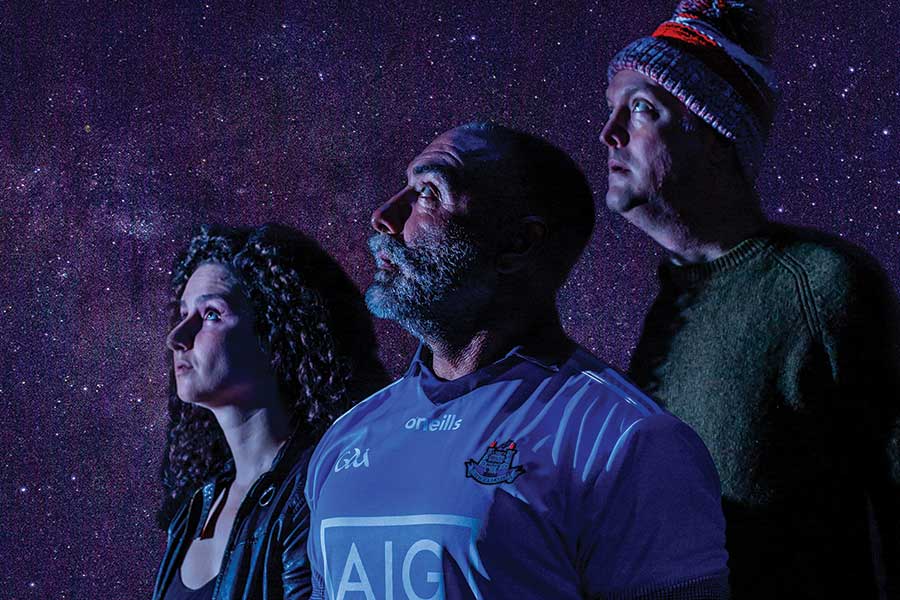Inis Nua Theatre commences its 16th season, this week, with the Philadelphia premiere of Tony Award-nominated playwright Conor McPherson’s “The Night Alive.”
The City of Brotherly Love’s producer of provocative, contemporary, plays from Ireland, England, Scotland and Wales offers a tale of ordinary madness, starring out local actor Andrew Criss. As directed by Inis Nua founder and artistic director Thom Reing, McPherson’s tale of finding safety and solace from abusive relationships, past and present finds Criss’ Tommy battling, literally and figuratively, for his life.
Before October 11’s “The Night Alive” opening at Louis Bluver Theatre at the Drake, Criss talked to PGN about his time as a Philadelphia thespian.
PGN: I know you first from Mauckingbird Theatre, “Tartuffe” and Peter Reynolds. What do you think you gleaned from Reynolds and the Mauckingbird experience, especially the company’s LGBTQ focus?
AC: I’d been wanting to work with Peter Reynolds ever since seeing his production of “The Pirates of Penzance,” so I was delighted when he cast me as Orgon in “Tartuffe.” Peter blends comedy, camp and the classics in a way that makes them fresh, funny and relatable. Even though I was playing a straight man in our production, Peter, God bless him, gave me license to make Orgon not only domineering and bombastic, but also flamboyant and fabulous. Having permission to paint with all the colors of my own personality was liberating, and it’s influenced my work ever since.
PGN: What would you say, as an acting presence, is your signature? Your tell? Your tic? And why is that, do you think?
AC: I play people who have great power and great problems. Often, their power is the source of their problems. I’m drawn to characters who are intense, emotionally complex and physically capable; characters who can do all three Fs: fight, flee, and f–k.
PGN: How and why did you get to Inis Nua in the first place?
AC: Tom Reing, Inis Nua’s artistic director and founder, cast me in “Our Few and Evil Days” after seeing me play Leo Tolstoy in a production at The Lantern Theater Company. I’d enjoyed the plays I’d seen at Inis Nua: new plays — to me at least — skillfully acted in cleverly mounted productions.
PGN: After there, what was your perception?
AC: The Inis Nua productions I’d seen crackled with intriguing tension, and “Our Few and Evil Days” was no exception. I was delighted to find that, by contrast, the rehearsals and preparations for Inis Nua shows are calm and collaborative.
PGN: What do you think differentiates Tom as a director from others?
AC: Tom gives the actors great freedom to experiment. He’s never dictatorial in the room and welcomes the team’s ideas and perspectives, even when it’s later in the process. It’s never a problem to ask questions, and it’s never too late to try something to make the performances even better.
PGN: Who is or what is the character of Tommy for you? What can you tell me about the character and how your internalized him…. Go home with him at night?
AC: Though Tommy resonated with me from my first reading, I spent a lot of time thinking and re-thinking about what Tommy wants and why he wants it and what’s stopping him from getting it. He’s complicated, in an interesting way. We’re the same age, but (like me) he’s kind of a boy in a man’s body. Some of the problems that come with his place on his life path are problems I wrestle with. He longs for connection, even though people who love him (or will love him) are nearby. He swings between manic energy and melancholy. He interrupts —even himself — exaggerates, fibs, changes topics quickly and struggles to let go and love. He needs to love himself so he can love others. No matter how many times I watch Drag Race, I’m often — well, always — working on that one.
PGN: How does McPherson’s poetry speak to you, directly?
AC: McPherson’s plays are full of language that is incredibly simple and direct while exploring themes that are heart-stirring and universal. There is always something underneath, or just beyond, what is being said. The beauty comes not from the floweriness of the language, but in the thoughts, images and questions it provokes.
PGN: I have heard bits and pieces about the fight scene and the special fight choreographer. Tell me something funny or fascinating about being part of a stage brawl. And are you much of a boxer?
AC: Two words: head butt. Steve Wei, our fight choreographer and director, is awesome, and he’s designed a nicely nasty brawl. Minou Pourshariati (who is also awesome) plays Aimee and is our fight captain. Together they’ve helped everyone learn, refine and execute the stage combat. If I come off as a good fighter, they get the credit. And there will be blood.
